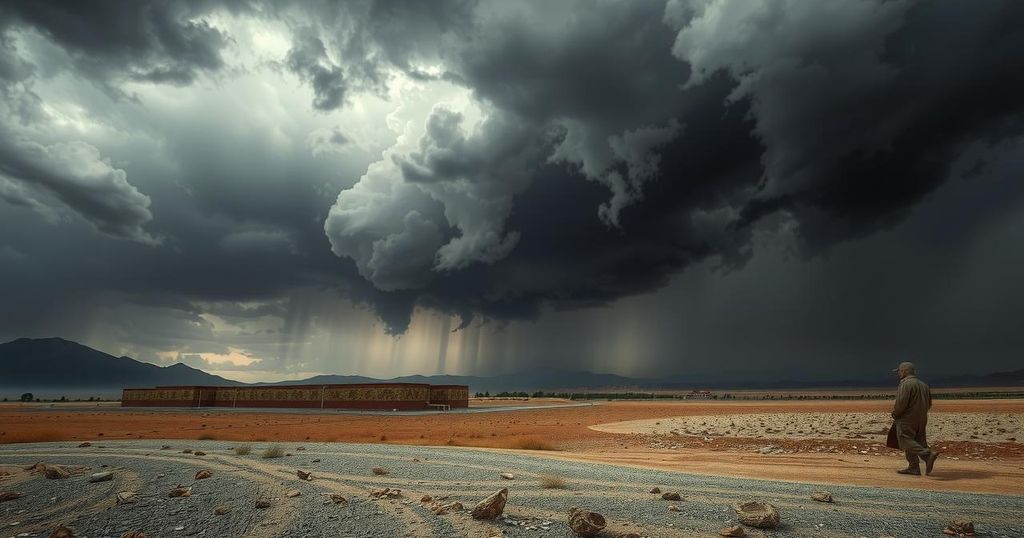Arrest of South Sudan’s Vice President Ignites Fears of Renewed Conflict

The arrest of Riek Machar in South Sudan has escalated political tensions, threatening a return to widespread conflict. The power-sharing agreement with President Kiir is unraveling, raising fears of renewed violence and regional destabilization. The international community calls for dialogue amid concerns over Machar’s allies’ detainment and ongoing clashes between rival factions.
The recent arrest of South Sudan’s First Vice President Riek Machar, a key adversary of President Salva Kiir, has escalated tensions in the country, bringing it to a critical juncture. Reports indicate that a convoy of 20 heavily armed vehicles forcibly entered Machar’s residence in Juba for his arrest, provoking concerns of widespread conflict as a power-sharing agreement between the two leaders collapses. This deal has unraveled progressively, raising fears of a resurgence of the devastating civil war that occurred between 2013 and 2018, claiming nearly 400,000 lives.
The military’s actions have drawn severe condemnation, with statements asserting that the unconstitutional approach, directed by the Minister of Defense and National Security Chief, amounted to an assault on Machar. Furthermore, reports highlight that his guards were disarmed before he was served with an arrest warrant under unclear circumstances. The repossession of power may signal a deepening unrest in a nation already plagued by violence and insecurity.
The United Nations Mission in South Sudan (UNMISS) has indicated that the country stands precariously close to renewed conflict, stating, “Tonight, the country’s leaders stand on the brink of relapsing into widespread conflict,” emphasizing the potential devastating effects on the region should the 2018 peace deal collapse. Despite gaining independence in 2011, South Sudan remains beset by challenges exacerbated by political strife, poverty, and ongoing hostilities.
Political analysts suggest that President Kiir, at 73 years of age, appears to be maneuvering to secure his successor and diminish Machar’s influence through various cabinet changes and arrests of Machar’s allies. In recent months, more than 20 of Machar’s associates have faced detainment, fueling fears of escalating violence prompted by clashes between rival forces, particularly in Upper Nile State.
Machar’s military faction, the Sudan People’s Liberation Army In Opposition (SPLA-IO), condemned recent hostilities, accusing government forces of terrorism and emphasizing their appeal for international intervention. Meanwhile, attacks on crucial military training centers established per the 2018 peace agreement have intensified the destabilizing climate, compounded further by unverified claims of aggressive actions from Machar’s forces by the Kiir-aligned army.
The local population is growing increasingly anxious about the potential for renewed violence. Many citizens, such as Lilian Sukeji, have voiced apprehension over the deteriorating situation, advocating for dialogue instead of aggression. The political landscape remains fraught, exemplified by recent meetings where Kiir expressed his commitment to peace amid persistent violence.
Political analysts have expressed grave concerns regarding the refusal of both leaders to engage in constructive communication. The ongoing clashes foreshadow a possible escalation into a decentralized and uncontrollable violence. In response to the increasing instability, several countries, including Norway and Germany, have closed their embassies in Juba, while the United States and British embassies have reduced staffing and cautioned their citizens about safety.
The arrest of Riek Machar marks a pivotal moment for South Sudan, with political tensions heightening and a potential return to conflict looming. The unraveling power-sharing agreement between him and President Salva Kiir is at the heart of escalating violence and apprehension within the country. Calls for dialogue and international intervention underscore the urgency of addressing this precarious situation to prevent further destabilization in the region.
Original Source: www.news.com.au







